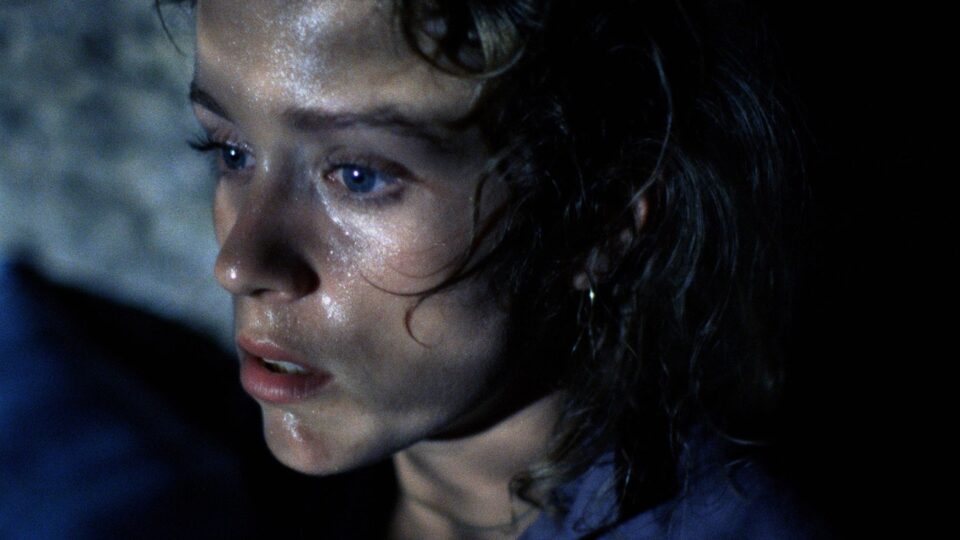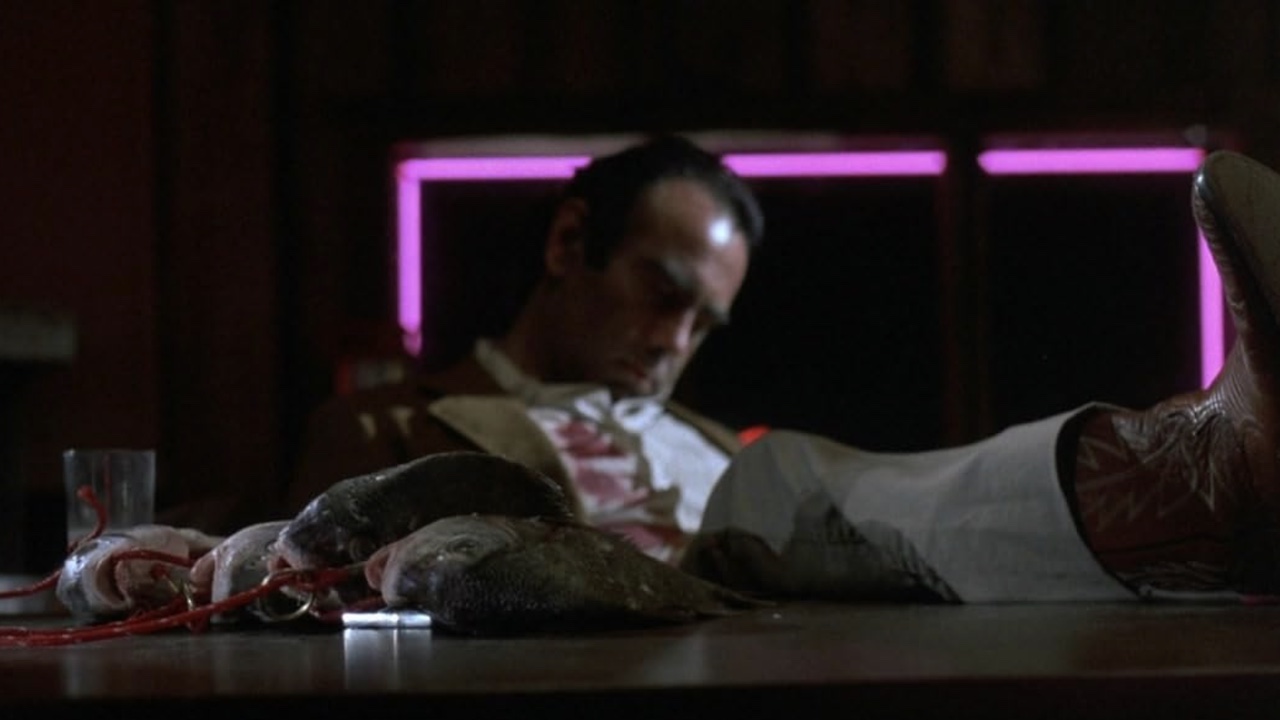In the films of Joel and Ethan Coen, what goes around comes around. Whether their characters hammer away at rocks in rural Mississippi or screenplays in Hollywood hotels, whether they just want to find their cat or go bowling, whether we find them staring down another short stint in the joint or at the end of one doomed relationship and the beginning of another, they’re almost always trapped in vicious cycles beyond their control. The Coens’ is a universe not of fairness or justice or even reason, but of inevitability—where plots thicken and plans unravel, and yet everyone ends up precisely where they were always meant to be, the whole durned human comedy perpetuatin’ itself once more.
It’s a cycle that began some 40 years ago with Blood Simple, a twisted tale of love and comeuppance that remains an astonishingly clear-eyed statement of purpose, one that’s echoed throughout the storied careers of the Coen brothers. But is it really so simple? Of course not. In 1984, Joel and Ethan Coen weren’t the crown princes of existential neo-noir, they were just two pseudo-intellectual dudes from Minnesota. Their debut film’s humble origins date back to the early ’80s, when the brothers decided to put together a trailer for the yet-unmade Blood Simple script they’d been working on (which notably featured none other than Bruce Campbell in the lead role). Using this as proof of concept, the two shopped the trailer around to dozens of financiers, which included local businessmen and dentists, aiming to raise a million dollars.
The next few years saw the brothers very much flying by the seat of their pants, learning to construct an independent feature from the ground up with next to nothing in the way of experience. This eventually led to Blood Simple’s debut on the festival circuit, where it won the Grand Jury Prize at Sundance, cementing the brothers’ status as up-and-comers in the moment’s growing American indie scene. It seemed critics responded not only to the undeniable reverence the film had for classic noir of Hollywood yesteryear, but the layer of grimy depravity the Coens had smeared all over their tale of deceit and betrayal.
If you’ve seen any of the dozen or so classics they’ve made since, the set-up will sound somewhat familiar: Abby (Frances MacDormand in her debut role) is stuck in the quiet despair of an unhappy marriage to smarmy bar owner Marty (Dan Hedaya), leading her into the arms of local grizzled bartender Ray (John Getz). Marty gets wise to the affair, or at least to the possibility, and hires private dick Loren Visser (M. Emmet Walsh) to get to the bottom of things. When he returns with a lurid scrapbook of proof, Marty arrives at the only possible conclusion for him to save face: the two must be killed. Visser, a sweat-drenched yokel clearly more than comfortable in the underbelly of society, is seemingly happy to perform the deed for the right price, only to turn the gun back on Marty in a scheme both ingenious and harebrained. From there, things become as muddled, violent, and disjointed as you might expect as bad judgement and worse communication lead almost all of the film’s main players to the slaughter.
For all the narrative consistency one might find in the Coens’ filmography (gruesome murders, hopeless blunders, dream sequences), the mood is often more important than the plot. The films they’ve made since Blood Simple all fall somewhere on a continuum between the irreverently zany and meticulously methodical. Blood Simple, for all its inventive and reverent dialogue, falls much closer to the latter. The many acts of self-sabotage that occur throughout the film unfold with painstaking care. Ray, upon finding Marty’s bloody body slumped over in his back office, may be handling the situation in exactly the wrong way, making assumptions that will unravel any hope of a happy ending. But he isn’t doing so with carelessness or neglect so much as simple bad luck. Even as the body count rises and nothing goes as planned, we can’t fathom any other way this gnarly human drama could’ve played out, the inevitability of the outcome built into every twist and turn.
Blood Simple also marks the first film for their longtime composer, Carter Burwell. Burwell’s theme here, understated and scant as it may be, arrives in some key moments. In a nod to Chekhov’s famous foreshadowing device, almost every shot of Abby’s pearl-handled pistol is accompanied by a ticking timebomb of thudding chords, a hauntingly spare melody, and a steady, shadowy clink of backing piano. It’s not the first death—or even the suggestion of one—that marks the beginning of the end for these characters, but instead the mere mention of the weapon which ultimately dooms them. In case the unavoidable nature of their fate wasn’t clear enough, the Coens’ use of The Four Tops’ Motown hit “It’s the Same Old Song” seals the deal, arriving first on the bar’s jukebox and eventually putting a bow on things just as the film’s final victim settles into his blood-soaked destiny.

The Coens have been accused of displaying a deep-seated nihilism concerning the human condition. “They believe in nothing,” goes the line—one they themselves would co-opt to hilarious result in The Big Lebowski. I don’t know if I agree with that assessment whole cloth, but it is hard to ignore its influence throughout their first feature. “Now, I don’t care if you’re the pope of Rome, President of the United States, or Man of the Year; somethin’ can all go wrong,” goes Blood Simple’s opening narration recited by Visser. “Now go on ahead, y’know, complain, tell your problems to your neighbor, ask for help, ’n’ watch him fly.”
The film’s response is not to punish this line of thinking, or even prove that humans will help those in need. Instead, it’s to assure viewers not only that things can go wrong, but they almost certainly will—and when they do, you’re on your own, buddy. “I’m staying right here in hell,” says Marty later on, not long before he begins to bleed out behind a pile of rotting fish, an apt description of the world the Coens have created with Blood Simple. The fact that Abby, in a kind of final-girl homage, is the one to make it out alive is not so much a case of innocence prevailing than a stroke of dumb luck. When she kills her would-be assailant Visser, looking to cover his tracks, she thinks she’s finally doing away with her menacing husband, only to learn that she doesn’t know what’s really going on. As it turns, that doesn’t matter, either, because anyone who might care is already dead.
In January of 1985, no one could’ve known that they were witnessing the beginning of the careers of two of the most important American filmmakers of all time. That said, something about all that disorder and meaningless malaise clearly struck a chord. From that point, the brothers’ ascendance was all but assured, leading to handfuls of awards and a half dozen of the most lasting, influential films of the turn of the century. And yet, perhaps nothing else was as simple, bloody, or inevitable as their debut. FL







